‘Camp Saved My Life’

B.K. Cannon always finds a way to leave her mark on others, including camper Addie and counselor Napua.
A cancer survivor herself, actress B.K. Cannon has been cheering on young patients ever since she first participated in Camp Ānuenue two decades ago.
There’s a camp on the North Shore that offers a week of free fun for kids ages 7-18, and it’s planning and fundraising for its 34th annual blast right now.
There’s only one requirement: All campers must have cancer or have been through it before.
Founded upon love and loss in 1985 by parents and medical professionals, Camp Ānuenue (meaning “rainbow”) is run by a wacky group of cancer survivors and friends who just want to give kids a break. The agenda has a theme and could include water fights, campfires, a zip line, crazy songs, face painting, stargazing, snorkeling, kayaking, bowling, a talent show, makeovers, a ropes course, great grub — even a prom.
President and co-director B.K. Cannon, 29, is a perfect example of what seven days of fun can do to help heal sick kids who feel isolated and discouraged by the disease.
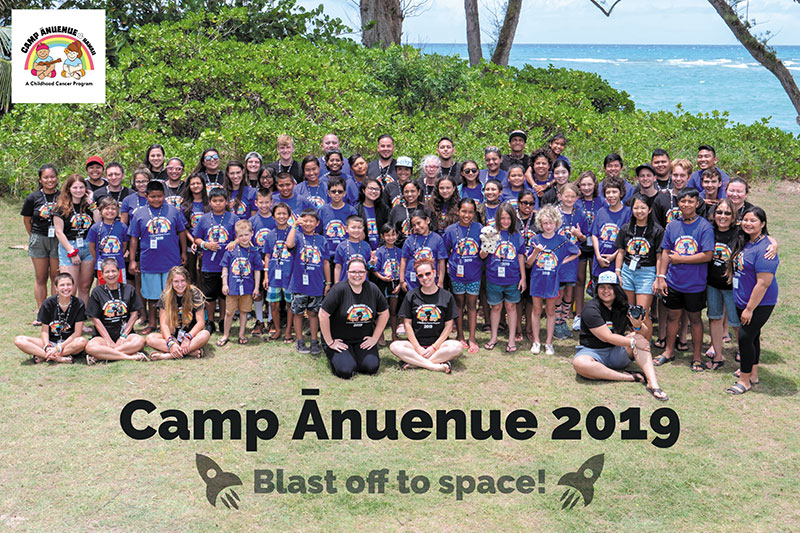
Taking one last group photo at the conclusion of 2019’s “Camp ˚nuenue Goes to Space.” PHOTOS COURTESY CAMP ANUENUE
Of the dozens of daily choices to make on the grounds of Camp Mokule‘ia, Cannon’s favorite is the zipline.
“It’s a great example of having to overcome something,” she explains. “The kids go crazy over it. In my first year there as a camper, it took me 45 minutes to work up the confidence — then I did it 30 times in a row! It was so worth it.”
To meet her today, you’d never suspect her near-tragic start on this planet.
Barbara-Kimberly Cannon is a healthy cheerleader for life who lifts up everyone around her — including her own parents — and she has an especially soft spot for the shy ones. Plus, she’s worked 10 years in her other career as an on-screen actress; coaches at a respected LA acting school and just returned from filming a Netflix production in New York.
“Camp saved my life in ways medicine could not,” she declares.
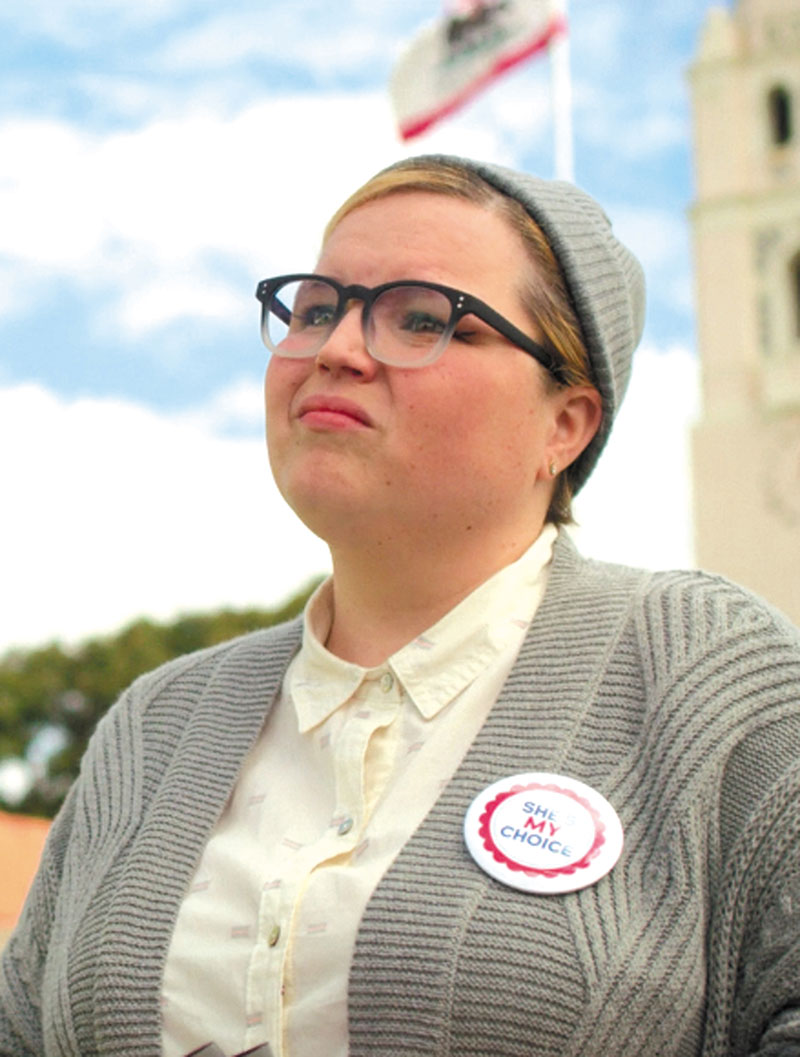
Cannon finds her groove in her role as Kris in the Golden Globe nominated series The Politician, which airs on Netflix. PHOTO COURTESY NETFLIX
As she described it to another publication, “It was filled with bald heads, medication rounds and squeaky wheelchairs. But it became my utopia — a place where acceptance was paramount, and love was boundless. I was finally in a community that understood me.”
In a way, she never left, returning year after year until today and taking on more leadership roles as she grew.
“My first blessing was beating the cancer, but my second was finding this camp,” she tells MidWeek. “Having had cancer gave me the passion to make sure Camp Ānuenue continues.”
The gregarious child was only 3 and 1/2 when doctors diagnosed her with stage 4 neuroblastoma. The long list of tough medical weapons used to fight it over the years — surgeries, radiation, relapses, body casts, transfusions, chemotherapy and more — is only exceeded by her long list of TV and film roles later on.
“I’ve had just as many surgeries and procedures in remission as I did in active treatment,” she admits. “But that’s the gig. Cancer is a lifelong journey.”
Here’s a tip for hospital stays: Besides learning to talk to adults, you have to be very good at entertaining yourself.
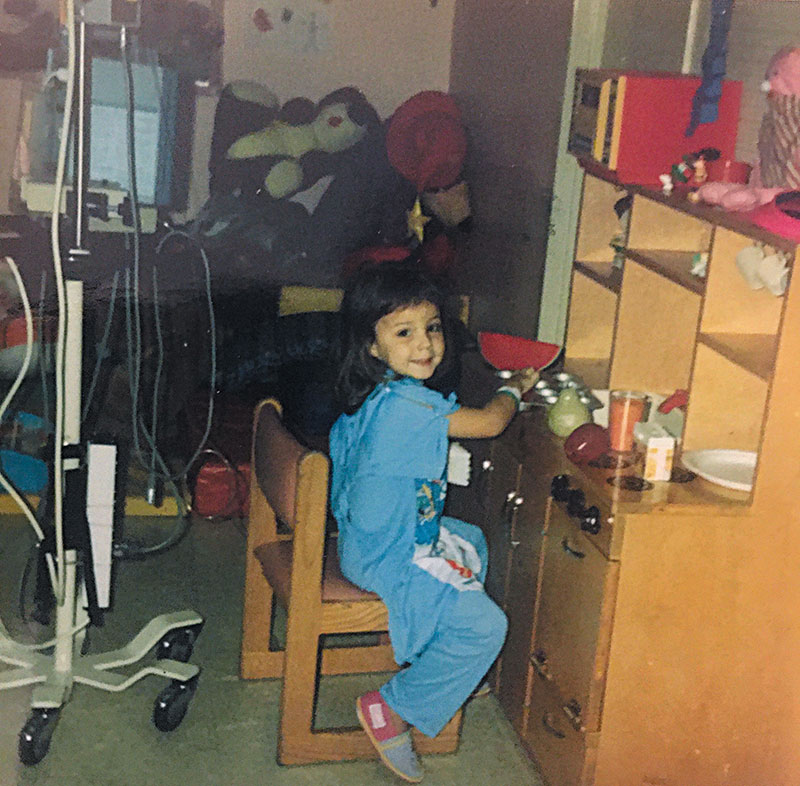
Getting ready for surgery after she was diagnosed with cancer at age 3
“I love humor, and in the darkest of times, my real go-to was laughter,” she told Mid-Pacific Today magazine. “I probably make myself laugh harder than I do other people.”
Like Cannon, many former campers are now doing well in life, and smiling a lot more. Children don’t like to stand out or feel different, explains Carol Kotsubo, a retired pediatric oncology nurse who helped found the camp with Dr. Robert Wilkinson of Kapi‘olani hospital and others.
“They want to do what children do. They want to run, to play, to sing and to have friends,” she says.
And under the camp’s safe conditions with medical help present, they can. Getting them to laugh and smile can change everything at the hospital, too.
“A new self-confidence allows the child to continue treatment with a determination to get it over with and to resume normal life,” says Kotsubo, noting that 80 percent of children do survive cancer.
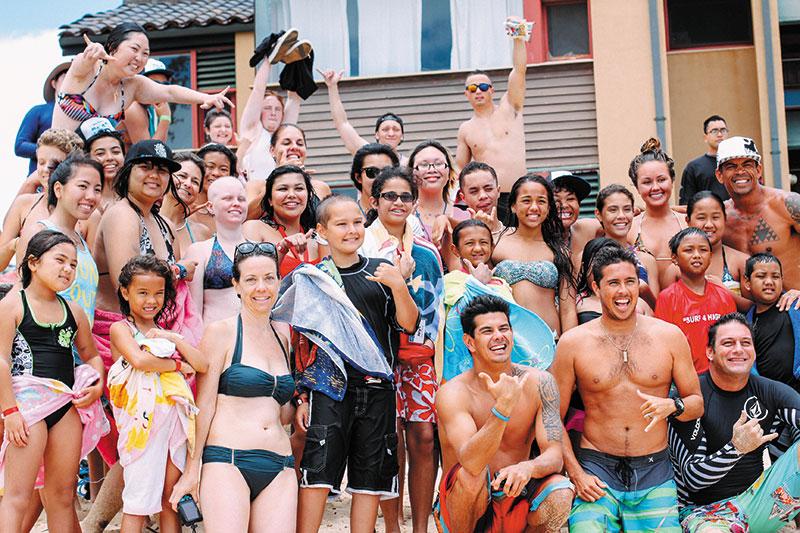
Playing around during her first Camp Anuenue in 1998 .
Here are some examples: • Arielle Underwood was born with an aggressive tumor on her tiny foot caused by fibroma sarcoma. Doctors amputated that foot to save her life, yet she eventually learned to dance ballet, ride a bike and now has a thriving commercial art career while teaching English in Japan. Her mother assembled a photo album to help her young classmates understand why she had that strange prosthesis at the bottom of her leg, and later wrote and illustrated the self-published book Arielle’s Footprints: A Child’s Journey to Surviving Prematurity, Cancer and Amputation.
“Camp Ānuenue was a wonderful, freeing adventure for her,” recalls mom AnnMarie Manzulli. “It was a big awakening for her about how lucky she was for what didn’t happen.” • Grace, 13, skipped a chemo treatment for the muscle tissue cancer rhabdomyosarcoma to attend her first camp and, after meeting the other kids, came away with renewed strength and a smile on her face.
“It made me want to keep fighting,” she declares in video testimony on the camp website. “I realized all these people were alive, and I could do it too.” • Just like Cannon, Hawai‘i Island camper Ruth Mersburgh, 18, also acquired neuroblastoma early. But after one year as a human pincushion, fighting nausea and isolation, she says, “I kicked cancer’s butt! And something those commercials with bald kids don’t show you is the mental/ emotional/social toll that these treatments take on kids and how they reach recovery. That’s what Camp Ānuenue is for.” • Even the few who don’t make it through have bestowed their legacy of compassion, empathy and fighting spirit upon their parents. Kāne‘ohe’s Irving and Cathi Chun, both social workers, helped establish and run the camp. Their daughter McKell died of leukemia before it even opened. They also assisted Ronald McDonald House here and ran cancer camps for teens and families.
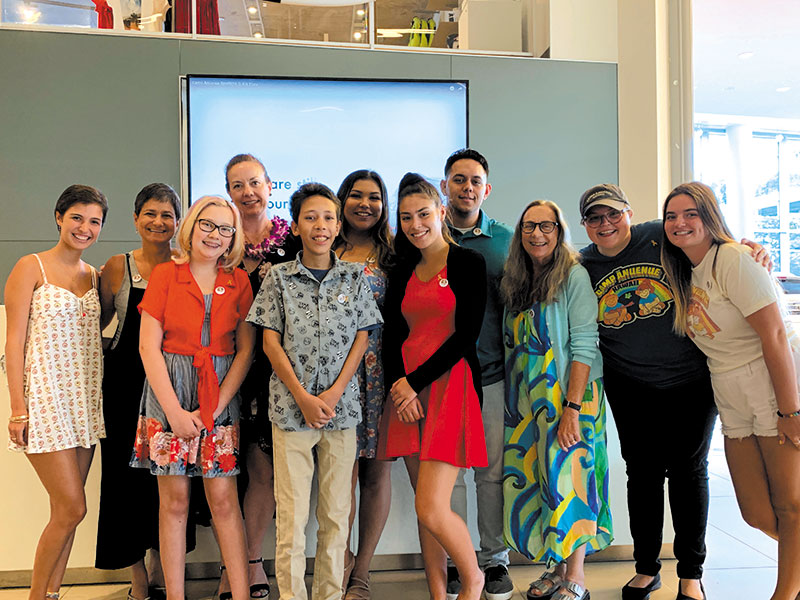
Spending an entire week with fellow campers “became my utopia — a place where acceptance was paramount and love was boundless,” says actress B.K. Cannon.
Irving calls their two decades with Camp Ānuenue “a phenomenal blessing for us personally and everyone there … When not in that circle, you don’t understand this cancer bond,” he adds. “There’s more joy in all of it than people realize.” • Award-winning videographer Ken Libby and wife Joyce joined the Ānuenue ‘ohana in 1990. Their son, Scott, enjoyed two camps and one day of a third one before he succumbed to rhabdomyosarcoma at age 9.
“He liked it better than anything other than Christmas,” recalls Libby, who came back for 22 camps in order to film and carefully edit the children’s experiences at no charge as a keepsake for them and their families. “I felt I had to shoot it, but most of the time I was crying. It was therapy for me, almost supernatural.” • Tom and Trudi Cannon also have been enriched through it all. Now living in Phoenix (closer than Kailua to their only child’s Burbank apartment), they’ve enjoyed forever friendships with other camp parents, doctors, nurses and understanding bosses.
Their upbeat child gave them the strength to help fight her cancer, Trudi says, recalling the ailing little girl who would jump right up as soon as she fell down and never complain. “B.K. has buoyed us until now.”
They watched her graduate from Le Jardin Academy and Mid-Pacific Institute, complete a year of home-schooling while auditioning in LA and earn a liberal arts degree there from Mount St. Mary’s University.
While at Mid-Pac for her junior and senior years, Cannon naturally joined its performing arts program and worked with teacher R. Kevin Doyle. He got to watch her blossom as a “big personality” and leader.

Hanging with Camp Anuenue cabin counselor and best friend Alison James. James was in active treatment for breast cancer, but has been in full remission since 2015.
“She was already B.K. — I can’t claim the credit,” he laughs. “Everyone loved her right from the start and gravitated toward her. She was just a delight, and a consummate professional.”
Cannon was a familiar face in the TV series Switched at Birth, The Politician, Sorry for Your Loss and Sin City Saints; she was in both the TV movie and series Flight 29 Down, and clinched guest roles in hit shows like Bones, Grey’s Anatomy, Chicago Fire, Glee, The Mindy Project, ER, Criminal Minds, Law & Order: LA and House.
“I’ve been lucky enough to support myself doing it,” she says simply, “and I enjoy the process on the set.” The rejections in between are a challenge, she admits, but fighting cancer prepared her for it. “I don’t know who I’d be if I didn’t have cancer, and I would do it over again.”
She became close friends over the years with her cabin counselor Alison James. They even share a pet dog between their homes in California. So when American Cancer Society withdrew funding in 2014 from cancer camps nationwide in favor of more research for a cure, the pair turned the camp into a nonprofit with volunteer counselors and staff, supported by vigorous fundraising campaigns. (Cost is $70,000 per camp, plus $1,500 per camper.) They also pay to fly in campers from Guam, Saipan, American Samoa and the Marshall Islands.
“B.K. is full of energy, the opposite of me,” says James, a shy research biologist-turned pharmaceutical rep who volunteers as camp vice president and co-director. “It’s the scientist and the actor; I’m the producer and she’s the director. I mentored her through surgeries and body braces, and then the tables flipped really fast when I was diagnosed myself with breast cancer in 2014.
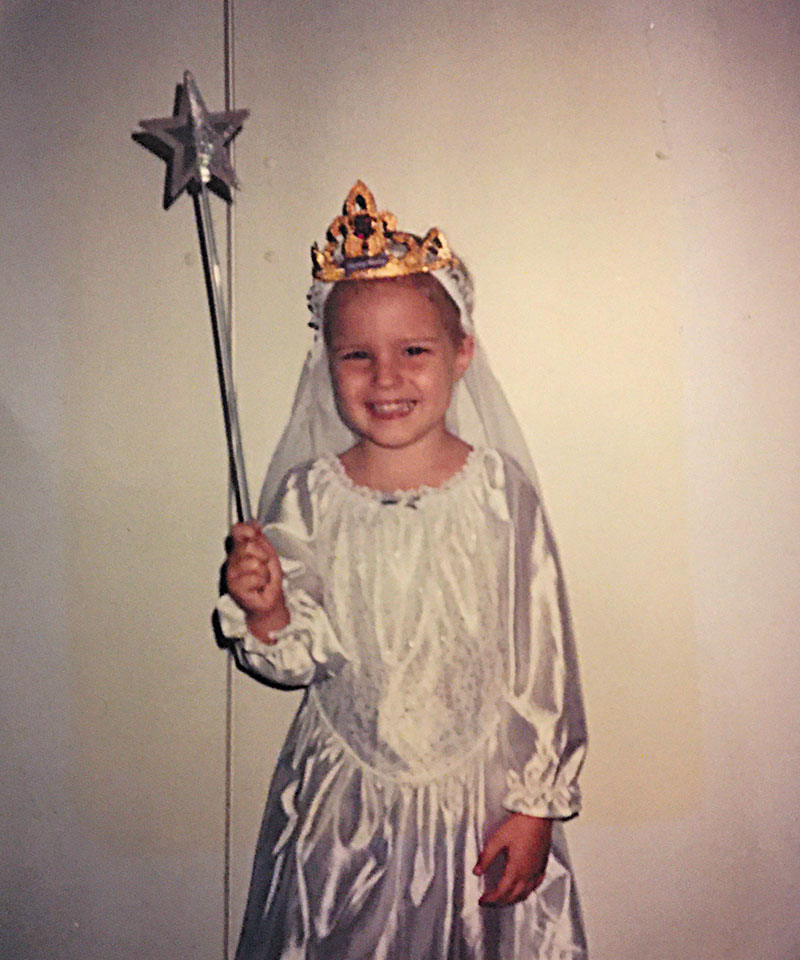
Cannon dresses up as a princess for Halloween soon after beginning her treatment in 1994.
“Amazingly, B.K. went with me to every appointment, surgery, etc. She rescheduled her auditions in LA and made it very positive — we laughed at every appointment,” James recalls. “The nurse even thought I was crying and sent for a social worker!”
It was another lesson learned, Cannon says. “Alison was an adult who got to experience going to camp bald and being totally accepted. She suddenly joined the club that I’d been in basically my whole life.”
One camp video shows Cannon and fellow actress Britt Robertson in a remarkable live-streaming effort that brought $55,000 into the 2017 budget. More recently, Cannon coached Robertson for her latest film role, in which she portrays singer-songwriter Jeremy Camp’s first wife, who died of ovarian cancer shortly after their wedding.
“When she accepted the part, we talked about it,” Cannon says. “She wanted to do an authentic portrayal.” I Still Believe stars KJ Apa and Robertson and comes out in March from Lionsgate.
Prospective camp counselors 18 and up can apply now through March 31 via campanuenue@gmail.com. Services and special talents are also welcome to enhance the daily schedule.
To apply or donate, go to campanuenue.com or call 349-7325. The next camp is May 31-June 6. Campers themselves should apply by May 1.
Researchers have visited and studied the camp over the years, including Marc Rich, who observed: “I do not recollect ever meeting a victim at Camp Ānuenue. Instead, I remember a camper in a wheelchair playing basketball with his friends. I see a young boy’s smiling face covered with ice cream. I recall an adolescent girl dancing the hula …”
To register, donate or learn more about Camp Ānuenue, visit www.campanuenue.com.






